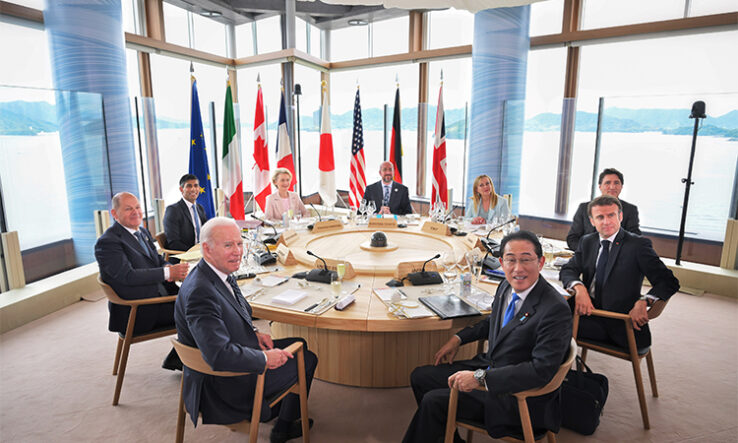
Image: European Union / Dati Bendo
Clean-tech race is “opportunity to go faster and further together”, says European Commission president
European Commission president Ursula von der Leyen has called on the G7 group of leading global economies to cooperate more on clean technologies for mitigating climate change.
During the first session of a G7 summit taking place in Hiroshima, Japan, on 19 May, von der Leyen said the group—comprising Canada, France, Germany, Italy, Japan, the UK, the US and the EU—should “create new forms of clean-tech cooperation”.
“We should always keep in mind the old saying: ‘If you want to go fast, go alone; if you want to go far, go together.’ This clean-tech race is an opportunity to go faster and further, together,” said von der Leyen (pictured fourth from left with the other G7 leaders).
In the lead-up to the summit, she said building up clean-tech capacities should be a “common goal” for the G7, warning that it should not be done at each other’s expense, as that would end up in a “zero-sum game”.
She said incentives should be “mutually reinforcing [and] not competing”, as the world “desperately needs…a huge leap” in the development of clean tech.
The Commission president called for the G7 to consider setting targets for building up global clean manufacturing capacity and to provide a “clear, predictable business environment” for clean-tech industries.
Ministers’ meeting
Ahead of the meeting of government leaders, science and technology ministers from the G7 met last week. They also highlighted the importance of clean tech, along with artificial intelligence, quantum technology and biotechnology, as “central to the green and digital transition, as well as to economic and national security”.
During their meeting from 12 to 14 May, the ministers adopted a joint statement highlighting that international scientific cooperation plays a “crucial” role in finding solutions to global challenges, including climate change, biodiversity loss, water scarcity, food insecurity and large-scale natural disasters.
They said the G7 would collaborate in expanding open science—research whose methods and results are made openly available for scrutiny and reuse—“with equitable dissemination of scientific knowledge and publicly funded research outputs”.
The statement added that further effort was needed to raise awareness among the research community of the risks of foreign interference in research, and of unauthorised knowledge and technology transfer.
China policies
Concerns about foreign interference in research often focus on China, and in another session of the G7, von der Leyen said the group’s policies toward the Asian powerhouse “need to change because China has changed”.
The country has become “more repressive at home and more assertive abroad”, she said, meaning that while the G7 countries should not decouple from China—instead keeping communication open on topics including climate change and pandemic preparedness—they should reduce their vulnerabilities by, for example, making their economies more resilient and controlling the export of important technologies such as clean tech.